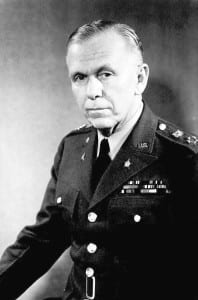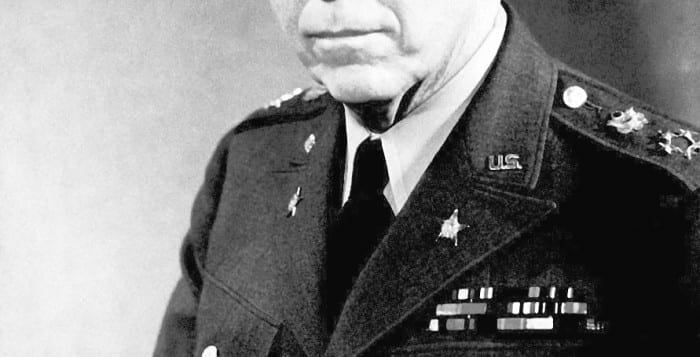By Rich Acritelli

It was 74 years ago that the Japanese attacked the United States at Pearl Harbor, spurring the nation’s entry into World War II. At the helm of the American military on that deadly day was Gen. George C. Marshall, and it was up to this outspoken man to take a military of 175,000 — which was ranked 17th out of all the industrialized powers — and turn the troops into a tremendous force of 10.4 million to defeat Germany and Japan.
From the moment he entered the Army in 1902, Marshall excelled at every task assigned to him. Unlike many of the West Point officers he commanded during World War II, he graduated from the Virginia Military Institute. His peers thought Marshall’s quiet and firm manner suited him for vital positions of military responsibility, and he held several different jobs in the Army, served in the Philippines and graduated first from the Army staff college in Fort Leavenworth, Kansas.
During the United States’ earliest moments in France in World War I, Marshall had a famous encounter with American Expeditionary Forces Commander Gen. John J. Pershing. When, upon finding the Army was not prepared for the burden of warfare on the Western Front, Pershing criticized his officers for not doing enough training, Marshall told Pershing that he did not understand the problems his soldiers faced daily and they were doing the best that could be expected of them. At first, Marshall believed he’d be sent home in disgrace; instead Pershing respected his honesty and clarity and eventually made him a main planner of American war operations against the Germans.
Years later, in the late 1930s, Marshall showed his leadership again when he sat in on a meeting with then-President Franklin D. Roosevelt and influential members of both his cabinet and the military. When Roosevelt outlined a plan of adding planes to the Army Air Forces but virtually no other resources to the Army, all of the leaders remained quiet or supported the president. Marshall, on the other hand, angered Roosevelt by vehemently disagreeing with him. But a year later, Marshall, who was a junior to many other officers, was promoted to Army chief of staff.
‘We must have the very best leadership we can possibly give these men and we’ve stopped at nothing to produce that leadership.’
— Gen. George C. Marshall, World War II Army Chief of Staff
Knowing war was a young man’s game, Marshall reassigned, fired or retired older officers who he knew were not able to fight a modern war. One of his most important choices was making one lieutenant colonel, Dwight D. Eisenhower, into an important member of his staff. While he never directly served with this officer, he was constantly informed that Eisenhower was one of the most well-rounded leaders in the military. He saw Eisenhower as a capable officer only interested in completing his duty. Marshall also elevated Gen. Omar N. Bradley to command the ground forces in Europe from D-Day to Germany’s surrender in 1945. It was Marshall’s manner not to dwell on the personal characteristics of his key leaders. This was the case with the erratic but brilliant combat fighter Gen. George S. Patton. Marshall stood by Patton throughout some of his troubles due to the strong belief that Patton would continually earn battlefield victories against the enemy.
From the time he became Army chief of staff, Marshall was determined to prepare his nation for the rigors of war. He drafted, trained, equipped and oversaw the total war efforts of the United States to defeat fascism, conducting all of those efforts in a professional manner, not seeking any credit for his massive contributions in the defense of his country. Marshall should be credited, however, with establishing a new army, command structure and strategy to conduct military operations against Germany and Japan. In a short period of time, he helped the United States attain a victory in an important war.
Rich Acritelli is a social studies teacher at Rocky Point High School and an adjunct professor of American history at Suffolk County Community College.





